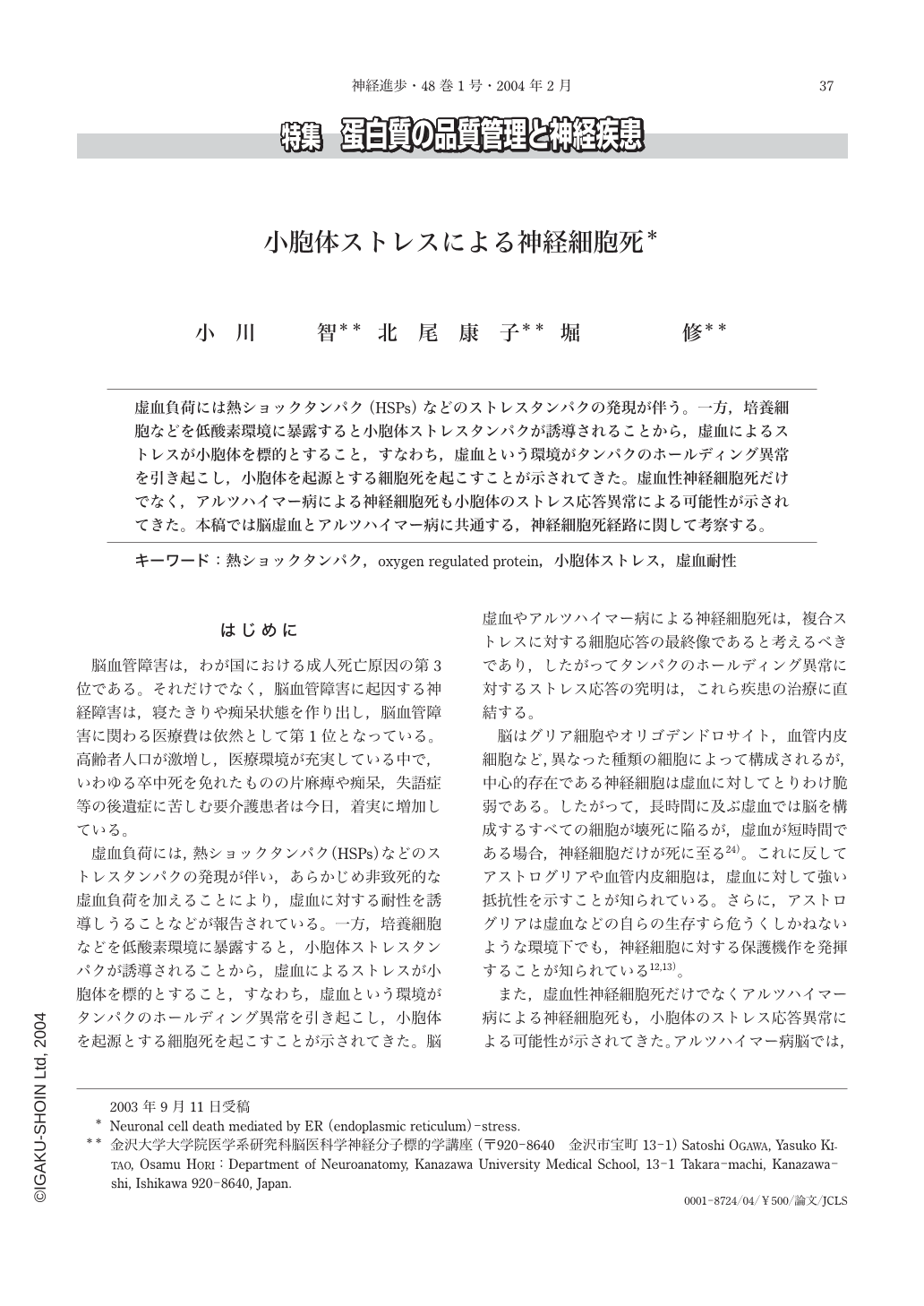Japanese
English
- 有料閲覧
- Abstract 文献概要
- 1ページ目 Look Inside
虚血負荷には熱ショックタンパク(HSPs)などのストレスタンパクの発現が伴う。一方,培養細胞などを低酸素環境に暴露すると小胞体ストレスタンパクが誘導されることから,虚血によるストレスが小胞体を標的とすること,すなわち,虚血という環境がタンパクのホールディング異常を引き起こし,小胞体を起源とする細胞死を起こすことが示されてきた。虚血性神経細胞死だけでなく,アルツハイマー病による神経細胞死も小胞体のストレス応答異常による可能性が示されてきた。本稿では脳虚血とアルツハイマー病に共通する,神経細胞死経路に関して考察する。
Cells subject to environmental change express stress proteins, which contribute importantly to maintenance of metabolic homeostasis and viability. As a most abundant cell type in the central nervous system, astrocytes are shows a phenotype resistant to environmental alterations. Based upon this ability of astrocytes we have purified and cloned a novel stress protein, ORP150, a 150 kDa oxygen regulated protein. By using transgenic mice, where ORP150 is overexpressed in neurons, we have shown that ORP150 can protect neurons from ischemia-induced cell death. We have also shown that ORP150 is an inducible chaperone present in endoplasmic reticulum(ER), which regulates cytosolic free calcium and activation of proteolytic pathways causing cell death in neurons subject to excitatory stress. Using mice heterozygous for ORP150 deficiency, exposure to excitatory stimuli caused hippocampal neurons to display exaggerated elevation of cytosolic calcium accompanied by an increased vulnerability to glutamate-induced cell deathin vitroand decreased survival to kainatein vivo. In contrast,targeted neuronal overexpression of ORP150 suppressed each of these events, and enhanced neuronal and animal survival in para-llel with diminished seizure intensity. Further, neuronal cell death originated from endoplasmic reticulum has been shown in Alzheimer's disease, a most popular neurodegenerative disease. Missense mutations in the human pre-senilin-1(PS1)gene, which is found on chromosome 14, cause early-onset familial Alzheimer's disease(FAD). Mutations in PS1 affect the unfolded-protein response(UPR), which responds to the increased amount of un-folded proteins that accumulate in the endoplasmic reticulum(ER)under conditions that cause ER stress. PS1mutations also lead to decreased expression of GRP78/Bip, a molecular chaperone, present in the ER, that can enable protein folding. The downregulation of UPR signalling by PS1mutations is caused by disturbed function of IRE1, which is the proximal sensor of conditions in the ER lumen. These results show that mutations in PS1may increase vulnerability to ER stress by altering the UPR signalling pathway. These data underscore a pivotal role for ER stress in neuronal cell death, and pinpoint a key organelle, the endoplasmic reticulum, the protection of which may leads to a development of novel strategy for neuronal survival.
(Received:September 11, 2003)

Copyright © 2004, Igaku-Shoin Ltd. All rights reserved.


